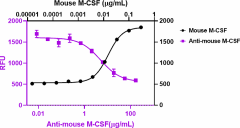- Clone
- QA19A27 (See other available formats)
- Regulatory Status
- RUO
- Other Names
- CSF1, CSF-1, MCSF
- Isotype
- Mouse IgG1, κ

-

Recombinant mouse M-CSF (Cat. No. 576406) (black circles) induces the proliferation of M-NFS-60 mouse musculus cells. Ultra-LEAF™ purified anti-mouse M-CSF antibody (clone QA19A27) (purple squares) inhibits the effect of recombinant mouse M-CSF at 20 ng/mL in M-NFS-60 cells in a dose-dependent manner. The ND50 = 2 – 10 µg/mL.
| Cat # | Size | Price | Quantity Check Availability | ||
|---|---|---|---|---|---|
| 935803 | 100 µg | $270.00 | |||
| 935804 | 1 mg | $715.00 | |||
Select size of product is eligible for a 40% discount! Promotion valid until December 31, 2024. Exclusions apply. To view full promotion terms and conditions or to contact your local BioLegend representative to receive a quote, visit our webpage.
M-CSF was first characterized as a glycoprotein that induces monocyte and macrophage colony formation from precursors in murine bone marrow cultures. M-CSF binds CD14+ monocytes and promotes the survival/proliferation of peripheral blood monocytes. In addition, M-CSF enhances inducible monocyte functions including phagocytic activity, microbial killing, and cytotoxicity for tumor cells as well as induces the synthesis of inflammatory cytokines such as IL-1, TNFα, and IFNγ in monocytes.
Multiple CSF1 mRNA species have been described that arise from alternative splicing in exon 6 and the alternative use of the 3’ end of exons 9 or 10. As a result, two distinct CSF1 protein products are encoded by these transcripts: a cell-surface or membrane-bound form of CSF1 (mCSF1) and a soluble form (sCSF1). Uterine sCSF1 is highly increased during pregnancy. On the contrary, uterine mCSF1 remains low during pregnancy. High levels of M-CSF have been associated to different pathologies such as pulmonary fibrosis and atherosclerosis.
M-CSF binds to its receptor M-CSFR, and this receptor is shared by a second ligand, IL-34. Mouse M-CSF and IL-34 exhibit cross-species specificity, both bind to the human and mouse M-CSF receptors. IL-34 can regulate myeloid development and substitute for CSF-1 in vivo. IL-34 has overlapping but not identical biological activities as M-CSF.
Product Details
- Verified Reactivity
- Mouse
- Antibody Type
- Recombinant
- Host Species
- Mouse
- Immunogen
- Recombinant mouse M-CSF
- Formulation
- 0.2 µm filtered in phosphate-buffered solution, pH 7.2, containing no preservative.
- Preparation
- The Ultra-LEAF™ (Low Endotoxin, Azide-Free) antibody was purified by affinity chromatography.
- Concentration
- The antibody is bottled at the concentration indicated on the vial, typically between 2 mg/mL and 3 mg/mL. Older lots may have also been bottled at 1 mg/mL. To obtain lot-specific concentration and expiration, please enter the lot number in our Certificate of Analysis online tool.
- Storage & Handling
- The antibody solution should be stored undiluted between 2°C and 8°C. This Ultra-LEAF™ solution contains no preservative; handle under aseptic conditions.
- Application
-
Neut - Quality tested
- Recommended Usage
-
Each lot of this antibody is quality control tested by the inhibition of proliferation induced by mouse recombinant M-CSF (0.02 µg/mL) on M-NFS-60 mouse musculus cells. ND50 range: 2-10 µg/mL. It is recommended that the reagent be titrated for optimal performance for each application.
- RRID
-
AB_2892497 (BioLegend Cat. No. 935803)
AB_2892497 (BioLegend Cat. No. 935804)
Antigen Details
- Structure
- Disulfide-linked glycosylated homodimer.
- Distribution
-
M-CSF is broadly expressed in adult mouse tissues. M-CSF is released by fibroblasts, breast cancer cell lines, alveolar macrophages, stromal bone marrow cells, endothelial cells, and mesenchymal cells.
- Function
- M-CSF is the key regulator of the survival, proliferation, and differentiation of mononuclear phagocytes and plays a central role in the regulation of osteoclastogenesis. CSF-1 also regulates the development of Paneth cells, Langerhans cells, lamina propria dendritic cells, and microglia.
- Interaction
- Monocytes, macrophages, mononuclear phagocyte precursors, microglia, proliferating smooth muscle cells, umbilical vein endothelial cells, and breast cancer cell lines.
- Ligand/Receptor
- M-CSFR or CSF1R (CD115)
- Cell Type
- Embryonic Stem Cells, Hematopoietic stem and progenitors
- Biology Area
- Cell Biology, Cell Proliferation and Viability, Immunology, Stem Cells
- Molecular Family
- Cytokines/Chemokines, Growth Factors
- Antigen References
-
- Kawasaki ES, et al. 1985. Science. 230:291-6.
- Wei S, et al. 2010. J Leukocyte Biol. 88:495-505.
- MacDonald KP, et al. 2010. Blood. 116:3955-63.
- Hodge JM, et al. 2011. Plos One. 6:e21462.
- Morandi et al. 2011. Plos One. 6:e27450.
- Erblich B, et al. 2011. Plos One. 6:e26317.
- Gene ID
- 12977 View all products for this Gene ID
- UniProt
- View information about M-CSF on UniProt.org
Other Formats
View All M-CSF Reagents Request Custom Conjugation| Description | Clone | Applications |
|---|---|---|
| Ultra-LEAF™ Purified anti-mouse M-CSF Recombinant Antibody | QA19A27 | Neut |
Compare Data Across All Formats
This data display is provided for general comparisons between formats.
Your actual data may vary due to variations in samples, target cells, instruments and their settings, staining conditions, and other factors.
If you need assistance with selecting the best format contact our expert technical support team.
-
Ultra-LEAF™ Purified anti-mouse M-CSF Recombinant Antibody

Recombinant mouse M-CSF (Cat. No. 576406) (black circles) in...
